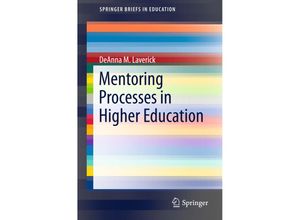This book portrays the various ways in which mentoring occurs in higher education. Targeting
the stakeholders who benefit from mentoring namely faculty graduate and undergraduate
students and their professional colleagues this book supports those who are involved in the
mentoring process. It synthesizes the professional literature on mentoring and shares examples
of effective practices that address the needs of mentors and their protégés. The book describes
mutual benefits of mentoring along with the characteristics of effective mentors and the ways
in which they may support their protégés. The relationships discussed in Mentoring Processes in
Higher Education surround mentoring new faculty peer mentoring for professional development
mentoring through research scholarship and teaching opportunities and mentoring through
field experiences athletics and student organizations. The book shares the voices of mentors
and their protégés as it illustrates how mentoring relationships form the basis for reflection
a transaction of ideas and growth in knowledge and skills to ultimately advance the
institution and field through a collaborative environment in which stakeholders thrive and are
valued for their contributions. The cyclical effect of positive mentoring is illuminated
through real-life examples that show how protégés eventually become mentors in a continual
process of support.

